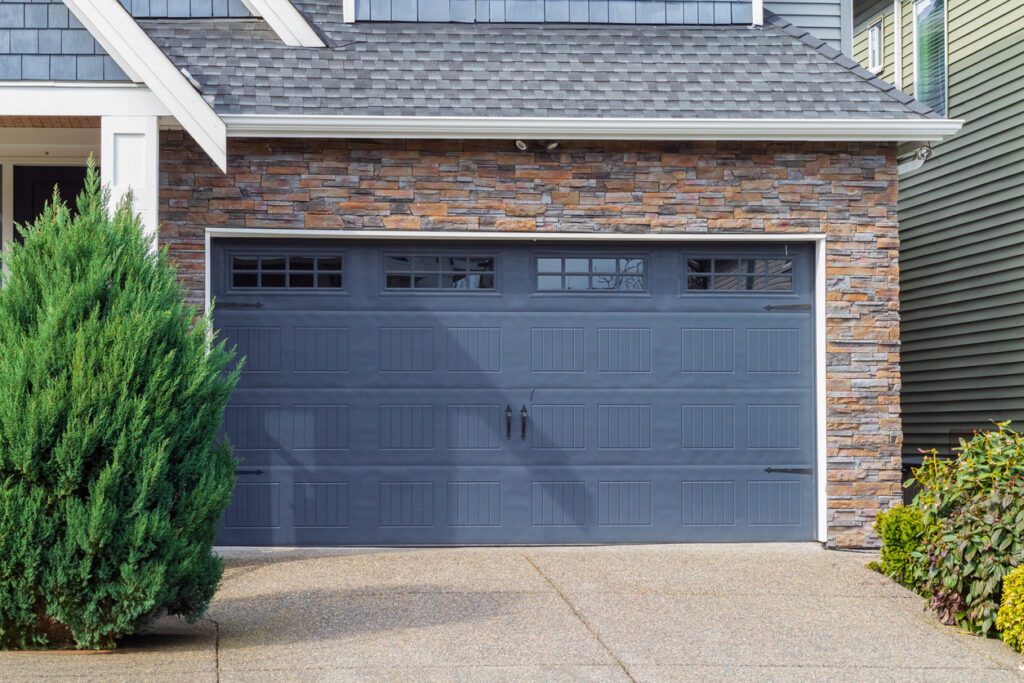Your garage door might seem simple, but it’s a complex mechanism made up of many moving parts. Each garage door part works together to provide smooth operation, security, and safety. When one component fails, it can lead to major inconvenience—or even accidents. By understanding how these parts work, you’ll be better prepared to handle maintenance and repairs.
Main Parts of a Garage Door System
A garage door system relies on several key components. If any of these are damaged or worn out, the entire system can malfunction. Here are the main parts to know:
1. Springs
- Two types: torsion springs (mounted above the door) and extension springs (along the sides).
- Purpose: Springs counterbalance the door’s weight, making it easier to lift.
- Safety Note: Broken springs are dangerous and should only be replaced by professionals.
2. Tracks and Rollers
- Tracks guide the door’s movement along the ceiling and walls.
- Rollers help the door glide smoothly within the tracks.
- Misaligned tracks can cause grinding noises or a stuck door. Regular alignment checks help prevent these issues.
3. Cables
- Cables work with the springs to support the door’s weight.
- Damaged cables can cause the door to fall suddenly, posing a serious safety risk.
3. Garage Door Opener
- The motorized opener automates the door’s operation.
- Newer openers include smart features, such as remote monitoring and mobile app control.
Understanding these components can help you identify early signs of trouble. These would include things such as jerky door movement, loud noises, or total failure to open.
Why Springs Are Critical for Safe Operation
Garage door springs do most of the heavy lifting. Over time, they can wear out through repeated daily use. Signs of spring problems include:
- The door won’t open fully or feels extremely heavy if you’re opening your garage door manually.
- You hear a loud bang, indicating a broken spring.
- The door moves unevenly or gets stuck partway.
Broken springs are under high tension and can cause injury if handled incorrectly. Robert’s Garage Door Professionals can replace springs safely and efficiently, often during the first visit.
Garage Door Sensors: A Safety Must-Have
Modern garage doors are equipped with sensors to prevent accidents. These sensors ensure that the door doesn’t close on objects, pets, or people. Here are the main types:
1. Infrared Sensors
- Positioned near the bottom of the door, these sensors create an invisible beam.
- If something interrupts the beam, the door automatically reverses.
2. Contact Sensors
- Installed on the bottom edge of the door, these detect direct contact with objects.
3. Smart Sensors
- These sensors integrate with smart systems to provide alerts and remote access. This integration allows you to monitor your door’s status from anywhere.
Testing your sensors monthly ensures they work properly. If sensors fail, your door may close unexpectedly, which could lead to serious accidents.
Choosing the Right Garage Door Material
In your grandparent’s day, wood was probably the only option for garage doors. That is no longer the case! Both residential and commercial garage doors now are available in various materials. Each material has unique benefits depending on your needs:
1. Steel
- Strong and low-maintenance. Many steel doors offer insulation to improve energy efficiency.
- Ideal for Chicago’s climate because of its resistance to warping and cracking.
2. Wood
- Offers a warm, natural look but requires regular maintenance to prevent rot and warping.
3. Aluminum
- Lightweight and resistant to rust. However, it is less durable than steel.
4. Fiberglass
- A durable, lightweight material that resists moisture, making it great for areas with high humidity.
When selecting a door, consider insulation (R-value), durability, and curb appeal. Robert’s Garage Door Professionals offers a wide selection of materials and custom designs. Our goal is to meet your style and functional needs.

Benefits of Regular Garage Door Maintenance
Routine maintenance helps prevent costly repairs and extends the life of your garage door. Key maintenance tasks include:
- Lubricating tracks and rollers to reduce friction and noise.
- Inspecting springs and cables for wear and tear.
- Testing the auto-reverse and safety sensors monthly to ensure proper operation.
Annual inspections by professionals can catch hidden issues before they turn into major problems. Our team offers yearly maintenance plans to keep your door in top condition.
Why Choose Robert’s Garage Door Professionals for Your Garage Door Services?
At Robert’s Garage Door Professionals, we’re dedicated to keeping your family safe. We are a family-owned local business with over 50 years of combined experience. Our highly skilled technicians provide expert repair services using top-quality parts at competitive prices.
We offer:
- 24/7 Emergency Repair Service
- Free On-Site Consultations
- Custom Garage Door Solutions for Homes and Businesses
- Smart Garage Systems with Wi-Fi-compatible features
Whether you need spring replacement, sensor repairs, or a full door upgrade, we have you covered. Our team can often complete tough repairs during the first visit.
Schedule Your Garage Door Inspection Today
Understanding your garage door’s components is key to ensuring its safety and performance. Let Robert’s Garage Door Professionals help you maintain your system.
Call us today to schedule your free consultation or safety inspection. We proudly serve Chicago and surrounding areas with expert care and reliable service.


